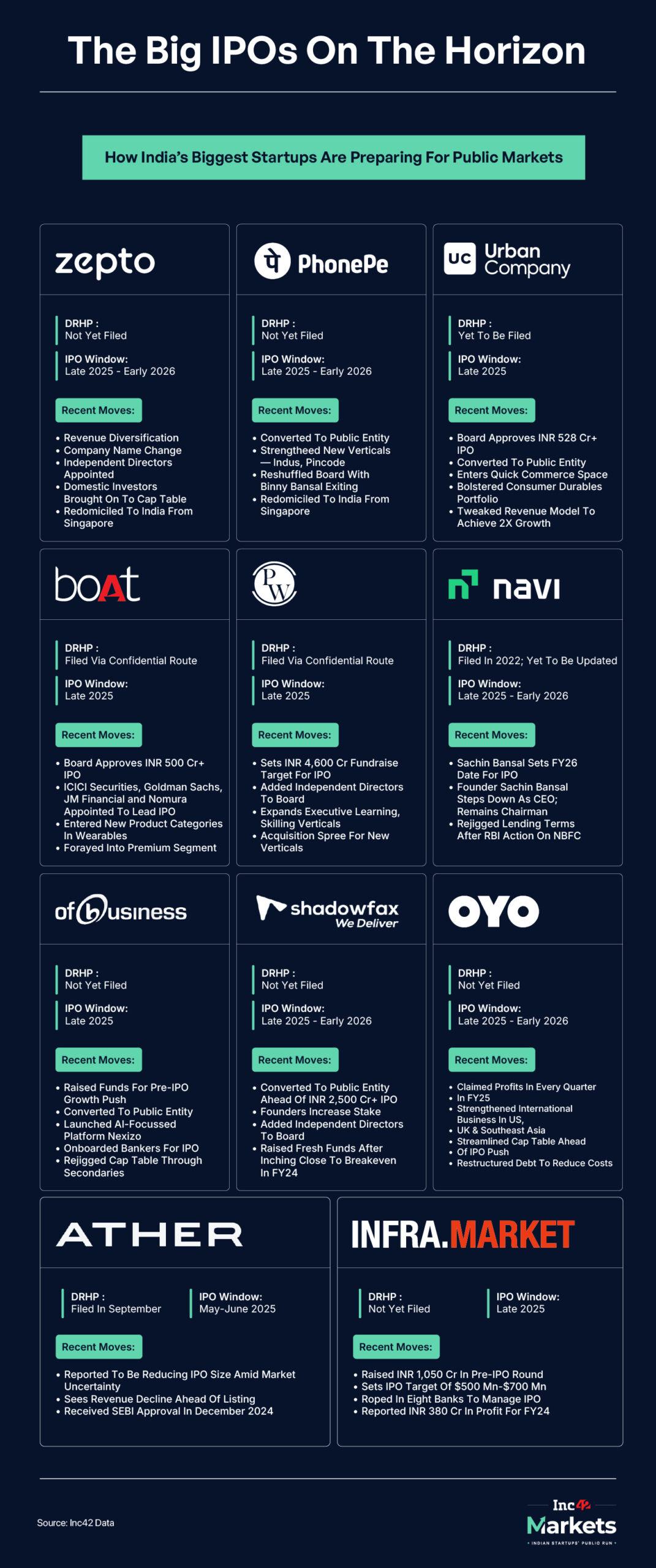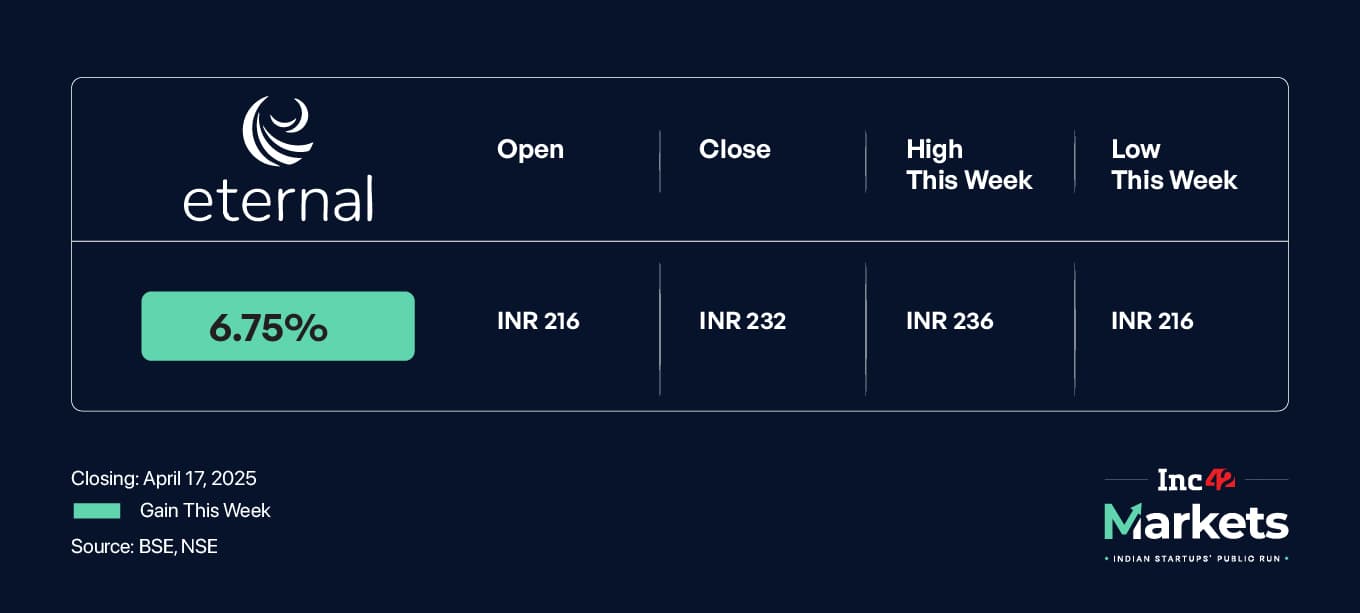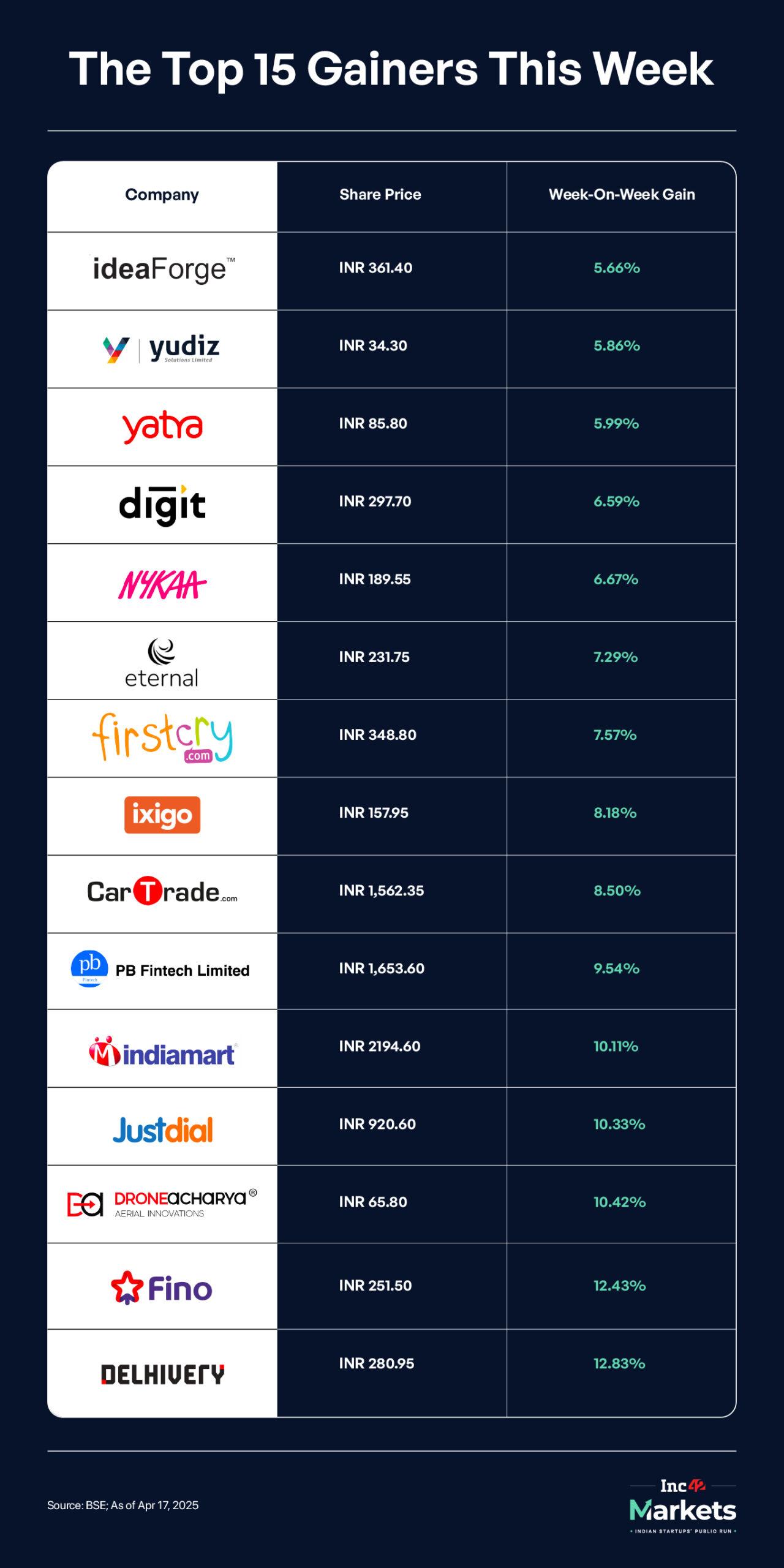In less than three months into his second stint as the US President, Donald Trump has thrown dozens of startup IPOs in India into a bit of confusion with his tariff wars.
The US tariff changes and the potential impact on foreign investors has compelled many Indian startups to rethink their public listing timelines, valuations and IPO sizes.
As per , 36 Indian startups are in various stages of their IPO journey, with some such as Ather Energy, PhysicsWallah, boAt, OYO and others waiting for the right market timing and SEBI approvals. How will the tariffs and the potential geopolitical implications on foreign investors affect these Indian startup IPOs?
Billions On The LineMore than $20 Bn (INR 1.6 Lakh Cr) is expected to be raised from the public markets from listings over the course of the next two years, with the likes of PhonePe, OYO, PhysicsWallah, OfBusiness, Urban Company expected to lead the way in 2025 and early 2026.
Collectively, the 36 startups waiting in the IPO queue have raised more than $12.2 Bn (INR 1.1 Lakh Cr) in VC and PE money over their lifetimes, so a lot rests on their IPO fortunes.
And while the year began with great expectations, a lot of that enthusiasm is now being walked back into the freezer, largely because of the tariffs proposed by Donald Trump in US, which will have second and third order impacts in India.
Some analysts are worried about the impact of foreign investors cashing in on their India startup portfolio through IPOs, which is why many startups continue to be bullish about an IPO in a bearish market.

Since September 2024, FIIs (Foreign Institutional Investors) in India have withdrawn more than INR 2 Lakh Cr out of Indian equities. For many startup IPOs, it’s essential that these FIIs invest some of this back into new IPOs, as typically this has driven demand for large public issues.
So, why are startups rushing towards IPOs in this uncertain market? The clue might lie in the fact that FIIs still have a great appetite to generate more alpha from their investments in India.
That’s why many startups are racing to the IPO finish line, so their investors can realise returns on their existing investments. This is especially true for startups with significant presence of foreign investors on their cap table.
Indian Startup IPOs & Trump’s Tariff Wars“Geopolitically, the markets are very, very muted and sensitive right now, and no one is certain about a future forecast or outlook. Many startups just want to get it out of the way now since they have been preparing for it for months,” said a Mumbai-based early stage investor that has invested in three companies that are heading for the bourses.
There is a third reason, and this explains why we saw a glut of DRHPs in the final days of FY25.
“If the DRHP had been delayed, the companies would have had to file the results for the quarter ending December 2024, which has been a globally weak quarter. So by filing before April, companies could show the results as of September 2024,” the investor added.
This is definitely helpful in setting the right narrative from the beginning, and even if companies have to make further disclosures later, a lot of the market is already convinced one way or the other about whether it should invest in the issue.
Regarding the US IPO markets and the tariffs imposed by Donald Trump, JPMorgan Chase & Co’s head of Americas equity capital markets Keith Canton told a Bloomberg that most ongoing processes and deals are currently on hold for the short term among US investors. The investment bank advised issuers to stay prepared and reassess the situation on a weekly and daily basis.
Meanwhile, in India, a number of companies have reduced their IPO sizes. Urban Company and Ather Energy are two examples, both of which reduced the amount they are looking to raise and the valuation.
“The slowdown is clearly perceived, valuations have been adjusted, and IPOs are being priced according to the market’s new reality,” V Jayasankar, managing director at Kotak Investment Banking, said.
The drop in mega deals in the Indian startup ecosystem is another sign that valuations are still an issue for investors even as the IPO market saw a massive surge in India last year.
Forget Rich ValuationsWhich sectors among the startups that are going for IPO in India can expect to have the most negative impact from the tariffs in the US? Investors we spoke to believe that investor interest in small and mid-cap new issues is rather weak at the moment because of the value erosion fears.
Large issues will also face some headwinds, especially if they look for VC-like valuations from public markets.
“Companies such as Zepto, boAt, or OfBusiness, which are either looking to raise primary capital or are valued at rich multiples will find it tough to crack deals. This is also true for private markets today, so the whole ecosystem has shifted,” the Mumbai-based venture capital investor added, backing Jayasankar’s view.
As for sector-specific distress or weak performance, it would be hard for any analysts to say with certainty which Indian startup IPOs might pop after listing and which might fail, particularly because of unstable market and the evolving situation around the tariffs in the US.
But the clear advice by investors and analysts is that founders get the pricing right or face some short-term pressures in a volatile market.
Just take the case of IPO-bound Ecom Express at a 50% discount to Ecom Express’ potential IPO fundraise. This discounting shows that companies cannot always bank on a high revenue scale to sell their IPO stories. Analysts scrutinising disclosures with a fine tooth comb looking for potential red flags and pressure points.
Stock In Focus: Eternal Curbs Foreign HoldingOne could say that the biggest story in relation to tariffs and how they might impact listed companies came from Zomato parent Eternal. The consumer services giant will soon , foregoing FDI from FIIs, foreign portfolio investors (FPIs) and non-resident Indians (NRIs).

With commerce minister raising concerns around foreign shareholding in quick commerce, Zomato’s decision could be seen as a way to limit FDI in the company. Eternal-owned Binkit’s rival Zepto is in the company before its IPO.
But Zomato would also want to limit any adverse impact or risks of high foreign shareholding in case the tariff wars turn nastier. “Maintaining the Indian-Owned-And-Controlled-Company status represents an important strategic lever,” Zomato said in a filing, claiming it would allow it to innovate faster, serve customers better, support local entrepreneurs, and deliver stronger returns to shareholders.
Like we mentioned above, FIIs have been on a selling spree in the Indian market, selling about INR 1.62 Lakh Cr worth of shares in the market — and this has exposed many stocks to volatility in the market.
Will having more Indian investors change this?
Meanwhile, most new-age tech stocks were on the up this week, as the Indian market moved in line with a recovery in the global markets. But nobody knows till when this rally might continue.

- In preparation for its IPO, Zepto has reportedly changed the name of its registered entity from Kiranakart Technologies Private Limited to Zepto Private Limited
- Walmart-owned PhonePe has converted into a public company, marking a major step in preparation for its initial public offering (IPO) where it is looking to raise funds at a $15 Bn valuation
- And just like PhonePe, Razorpay has also turned into a public entity ahead of its IPO, but the company said it is likely to take approximately two years to list
- Paytm CEO and MD Vijay Shekhar Sharma has voluntarily given up 2.1 Cr unvested employee stock options, which came under the scanner of markets regulator SEBI, with the stock being returned to the ESOP pool
The post appeared first on .
You may also like

BJP govt's two achievements are 'Pakora' and 'Bhagoda': Akhilesh Yadav takes jibe at BJP

What's New in Odisha's Real Estate? Discover ORERA 2.0's Game-Changing Features!

'New hope, new beginnings', Prez Murmu, PM Modi extend Easter greetings

Shock At WrestleMania 41: Paul Heyman Betrays Roman Reigns, & CM Punk To Help Seth Rollins Win Triple Threat In Stunning Main Event Twist

World Liver Day: Manipal Hospitals Hosts Major Health Screening Event in Bhubaneswar






